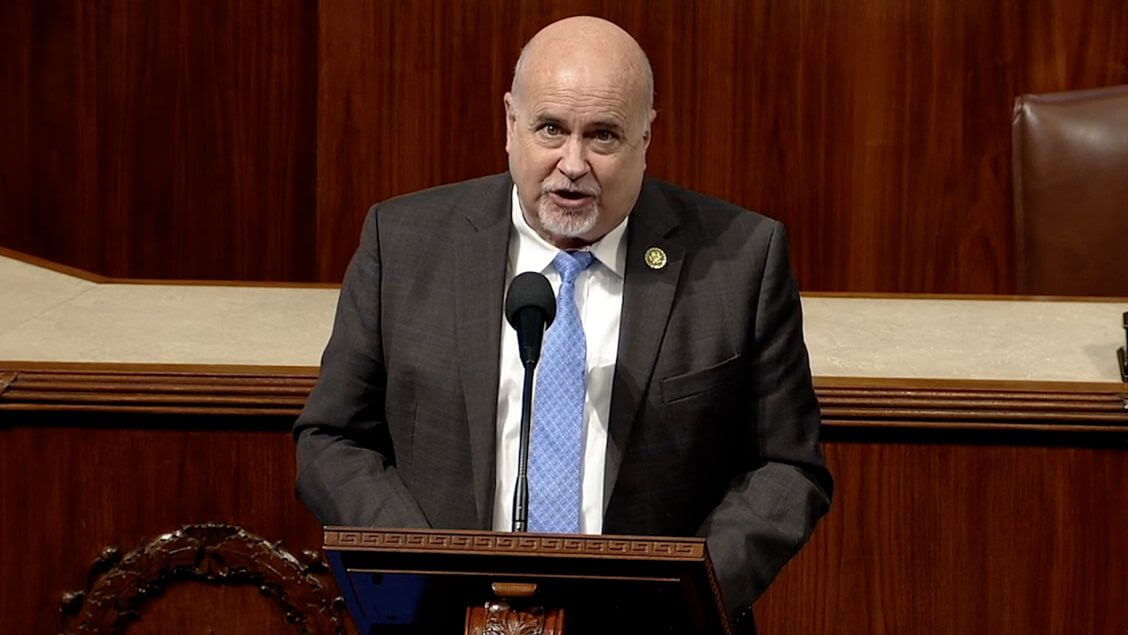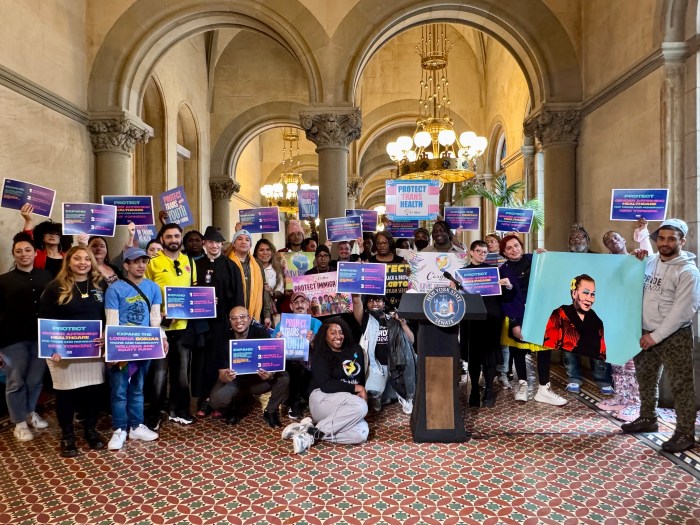A committee in the GOP-led House of Representatives on March 8 approved a bill targeting transgender student-athletes and another measure that purports to give parents more leverage over children’s education, drawing criticism from Democrats who are strongly opposing the legislative proposals.
Before a hearing that day, out gay Representative Mark Pocan of Wisconsin stood with advocates at the Capitol to condemn the anti-trans sports bill, which bars trans youth from participating in sports in accordance with their gender identity. The bill amounts to a ban because it states that under Title IX, student-athletes would be required to participate in sports in accordance with “a person’s reproductive biology and genetics at birth.” Facilities receiving federal funding would get hit with a violation if they allow to allow trans student-athletes to compete in women’s sports.
Although the bills passed the committee, they would still need to clear the full House of Representatives and neither piece of legislation stands a chance in the Democratic-controlled upper chamber.
As Pocan stood at the podium at the House Triangle at 10 a.m., the 25-member Education and Workforce Committee convened at 10:15 a.m. for its first legislative markup of 2023. The committee was reading two pieces of proposed anti-transgender legislation, HR 734, The Protection of Women and Girls in Sports Act, and HR 5, The Parents Bill of Rights Act, under which parents would be informed about the courses taught at schools. Introduced by Republican representatives Gregory Steube of Florida and Julia Letlow of Louisiana, the draft bills were undergoing first readings. Democrats proposed amendments, but at times the debate became heated and some members got emotional, especially during the discussion of HR 5.
The Education and Workforce Committee Chair, Republican Virginia Foxx of North Carolina, opened the hearing with a prepared statement insisting that Title IX is being “perverted to achieve the opposite of its intentions.”
“It’s now a tool used by the education bureaucracy to enforce inequality and unfairness,” she said before referring to transgender women with the offensive term “biological men.” She accused the Biden administration of imposing a “radical rewrite” of Title IX that “denies equal opportunity to women.”
Some Republican members agreed. Representative Burgess Owens of Utah stated that “female athletes who have spoken out against playing with transgender teammates have been shamed, bullied, canceled, and even kicked off the team, preventing them from going to graduate school or finding a job.”
Democrats did not miss the symbolism of reading the anti-transgender bills, especially HR 734, on International Women’s Day. Democratic members scolded their Republican colleagues for their attacks and chastised them for using Title IX inappropriately, and manifesting false claims rather than addressing real issues in an attempt to erase transgender youth. Democrats called it “misguided” and argued the legislation, HR 5, duplicated systems already in place. They urged their colleagues to vote, “no,” on both bills in the committee.
Representative Pramila Jayapal of Washington, who is the mother of a transgender teenage girl, proposed to rename the HR 734 the “Stigmatizing Vulnerable Children Act.” Democratic representatives who supported Jayapal’s proposal included out gay Congressmember Mark Takano of California along with Representatives Suzanne Bonamici of Oregon, Jamaal Bowman of New York, and Jahana Hayes of Connecticut.
Hayes asked why the bill targets transgender girls, noting that it doesn’t mention transgender boys. Republican committee members did not respond to her question.
Congressmember Federica Wilson of Florida argued that “Title IX would be weaponized against” transgender students under the legislation, calling the bill an “act of cowardice, an act of cruelty, and an act of just not recognizing that trans youth do exist.”
Discussing HR 734, Republican representatives refused to hear Democrats’ concerns about the dangers facing LGBTQ children if schools were to inform their parents about their sexual orientation or gender identity. They argued and cited statistics, and debunked the statistics Republicans cited, arguing that some queer and transgender youth do not live in supportive homes.
Jayapal got emotional, calling the bills “absolutely wrong” and stating that they suggest “that somehow there’s something wrong with our kids” simply because they don’t “identify in a way that you don’t see as appropriate if they change their name [and] if they just want to be who they are.”
“It’s insulting to me as a legislator because it’s completely without any factual merit in what you’re saying, but as a mom, it’s incredibly insulting,” she said. “Shame on us for using this forum in Congress, this incredibly privileged opportunity that we have here, to bring harm to children across the country, to foster and fuel hatred and divisiveness against a bunch of kids who are trying to be who they are. Come on, let’s actually do some real legislating and let’s stop this hateful speech.”
Outside the Capitol, Pocan was joined by the National Women’s Law Center’s Director of Justice for Student Survivors & Senior Counsel Shiwali Patel and mother and transgender parent advocate, Jamie Bruesehoff, and her transgender daughter Rebekah Bruesehoff, to speak out against the proposed bills, especially HR 734.
The congressmember said that the legislation “isn’t about sports” but rather “a larger, coordinated attack against transgender people and the larger gay community.” He pointed to the more than 30 anti-LGBTQ bills, mostly anti-transgender, signed into law last year, including three last week, and the now 380 proposed anti-LGBTQ bills swiftly making it through state legislatures across the country.
“This isn’t just about sports and trans kids,” said Jamie Bruesehoff, the mother of 16-year-old honors student and transgender field hockey player Rebekah Bruesehoff. “This is an attempt to dictate what an American family looks like.”
“American families can and do look like mine,” she said.
Pocan and Patel claimed Republicans were using women’s sports as a pawn against transgender youth. Pocan argued that Republicans were “targeting a handful of trans girls and women who participate in school sports” rather than addressing “real pressing problems impacting women’s and girls’ sports, including sexual harassment and assault, lack of equal resources, and pay inequality.”
Patel, a Title IX civil rights attorney, agreed, calling it “a bigoted and discriminatory attempt to target an already marginalized group, rather than address real barriers to gender equity and sports.”
Rebekah Bruesehoff, a sophomore in high school, called her team and sport her “community.”
“Field hockey gives me so much — confidence, strength, and a place to belong,” she said.
The straight-A honors student, who is the daughter of a pastor, argued that “sports are one of the most American experiences in any childhood.”
“A federal sports ban would alienate me from my community and prevent me from continuing to become a better version of myself,” she said.
Rebekah Bruesehoff’s mother, Jamie Bruesehoff, was angered by the idea that “lawmakers would spend more time debating whether our daughter gets to play with her friends than they would be protecting her from school shootings and gun violence is outrageous.”
Patel agreed, stating, “Banning certain students from sports merely because of who they are doesn’t promote fairness or safety for women and girls.”
“These bullying politicians will endanger the lives of trans kids for their own political purposes with the support of the GOP leadership,” Pocan added.
Pocan urged Republicans to refer to women’s and international sports organizations when legislating about women’s sports and transgender athletes. He noted that the Women’s Sports Foundation (founded by out lesbian tennis legend Billie Jean King, who serves as honorary chair) and the National Women’s Law Center both support transgender athletes, as do leading women athletes. The International Olympic Committee and the NCAA have guidelines for transgender athletes, he added.


































